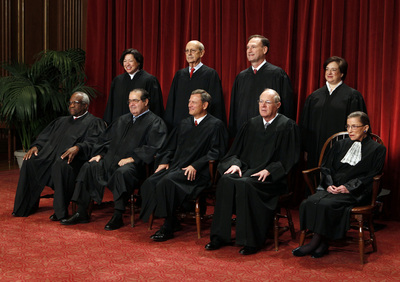The Supreme Court rarely takes up Second Amendment cases, so when it does, gun owners know their rights are in the cross hairs.
The Abramski ruling will be key to determining how far President Obama can push his gun-control agenda. Mr. Obama wants to expand background checks to include private transactions so that the government would know exactly who has a gun. That is not what the Founding Fathers intended.
On Wednesday, the high court heard oral arguments in Bruce J. Abramskiv. United States. The justices will decide whether to overturn an appeals court decision that said Mr. Abramski broke federal straw purchasing laws when he bought a gun with the intent to resell it to his elderly uncle, even though neither man is prohibited from ownership.
The court will have to reconcile conflicting rulings in lower appeals courts on whether a gun purchaser’s intent to ever transfer a gun in the future to a legal person is relevant in the background check at the time of purchase.
Mr. Abramski, a former police officer, bought the firearm in his home state of Virginia in 2009 because he could get a good price as former law enforcement.
His uncle, Angel Alvarez, sent a check for $400 with the note “Glock 19 handgun” in the memo line. Mr. Abramski called three licensed firearms dealers in advance to ensure he did the transaction lawfully.
At the store, Mr. Abramski filled out the Bureau of Alcohol, Tobacco, Firearms and Explosives (ATF) background check form No. 4473. Question 11a reads: “Are you the actual transferee/buyer of the firearm(s) listed on this form?”
Mr. Abramski checked the “yes” box. If he had checked “no,” he would not have been allowed to buy the gun. He passed the National Instant Background Check (NICS) and left the store with the pistol.
The next day, Mr. Abramski met his uncle at a gun dealer in Pennsylvania. Mr. Alvarez filled out the same NICS background check and passed. The two men filled out forms with the dealer to transfer ownership of the firearm.
No crime was committed with this firearm, but the ATF charged Mr. Abramski for perjuring himself on the background check for saying he was the “actual buyer.” The feds also charged him with not telling the first dealer that he planned to give the gun to his uncle.Read the rest of the Story HERE and view a related video below:
You can read the oral arguments in the case Bruce J. Abramski v. United States HERE.
If you like what you see, please "Like" us on Facebook either here or here. Please follow us on Twitter here.





No comments:
Post a Comment